Restaurant, bar owners still feeling the pinch as customers remain cautious about spending
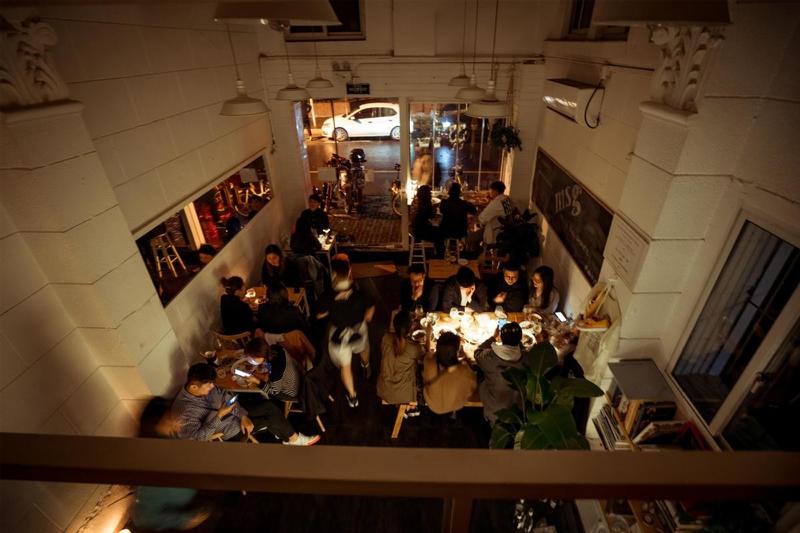 Customers gather at a Madison Soul Goodness pop-up event in Shanghai recently. (GRAEME KENNEDY / FOR CHINA DAILY)
Customers gather at a Madison Soul Goodness pop-up event in Shanghai recently. (GRAEME KENNEDY / FOR CHINA DAILY)
Boisterous weekend crowds at The Union Trading Co appear to indicate that business at this award-winning Shanghai cocktail establishment is back to normal as the COVID-19 outbreak comes under control in the city.
However, the truth lies somewhere in between.
The bar owner, Yao Lu, said: "Since the lockdown ended a month ago, business is slowly coming back. But while revenue on weekends is nearing the level seen before the pandemic, our weekday takings are still only 60 percent of normal."
Restaurants and bars have been among the businesses worst-hit by the pandemic, with many well-known outlets in Shanghai forced to shutter their operations.
Those that have closed for good during the pandemic include: Hakkasan, an internationally acclaimed modern Chinese restaurant chain; craft beer bar Stone Brewing; and Barules, a popular cocktail bar just across the road from The Union Trading Co.
According to a survey by Shanghai food critic Rachel Gouk, the situation has been bleak for restaurants and bars.
The study, which polled 488 restaurateurs and diners on April 11-12, found that revenue had returned to normal levels at only 4 percent of businesses following the easing of pandemic prevention measures the previous month. The majority of respondents-63 percent-were earning 30 to 60 percent of their normal revenue.
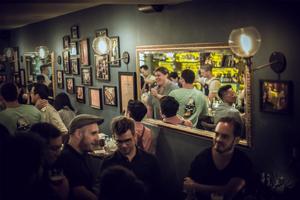 Drinkers return to The Union Trading Co, an award-winning cocktail establishment in Shanghai. (PHOTO PROVIDED TO CHINA DAILY)
Drinkers return to The Union Trading Co, an award-winning cocktail establishment in Shanghai. (PHOTO PROVIDED TO CHINA DAILY)
Austin Hu, the owner of Heritage by Madison, an upscale restaurant on the Bund, described the pandemic as "brutal" for food and beverage businesses, adding that sales at his restaurant fell by 80 percent during the peak of the outbreak in February.
The situation improved by March, with sales reaching 35 percent of the usual level, and by last month the proportion had risen to 50 percent.
Hu said, "We had to do many events around town, work with supportive suppliers to come up with deals and promotions, and basically burn through a year's worth of menus and ideas just to hit these numbers."
Smaller restaurants have not been spared either. Anthony Chow, owner of Bites and Bottle-O, a cozy 20-seater tapas joint on Danshui Road, said his business had little revenue during February.
While customer numbers have improved since then, he said revenue is still only half of what it used to be.
"Business started to pick up about a month ago, but people just aren't spending like before. They are much more conservative now because of the economic uncertainty this pandemic has created," he said.
This dip in spending is also reflected in Gouk's survey, which showed that a majority 39 percent of respondents said they would cut down on outlays.
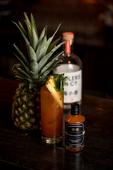 A cocktail produced by Laiba Beverages. (PHOTO PROVIDED TO CHINA DAILY)
A cocktail produced by Laiba Beverages. (PHOTO PROVIDED TO CHINA DAILY)
Impetus for change
In addition to screening measures such as health QR code checks and measuring customers' temperature, restaurant and bar owners have been forced to adjust their operations to stay afloat during the pandemic.
At Bites and Bottle-O, this has meant reducing staff members, working hours and wages. At The Union Trading Co, Yao has adopted a "drink the bar dry" strategy-purchasing new stock has been halted temporarily until current supplies are depleted. His bartenders have also agreed to be paid on an hourly, instead of monthly, basis.
With consumers still wary about the threat of infection in public areas, business owners have had to diversify their income streams.
For example, Hu organized pop-up events and movie nights in private rooms and made guest appearances at other dining establishments, while The Union Trading Co considered introducing online cocktail classes.
Many restaurants and bars have also introduced delivery services.
In March, The Union Trading Co collaborated with Laiba Beverages, a company supplying bottled cocktails, to deliver a special collection of these drinks to customers in Shanghai and across the country. At Bites and Bottle-O, a new delivery menu was launched, consisting of dishes suitable for reheating.
Even upscale restaurants such as Mr and Mrs Bund, a fine-dining venue by French chef Paul Pairet, have jumped on the bandwagon, with the eatery making some of its dishes available for delivery.
However, a delivery menu is just a stopgap measure for most businesses.
While deliveries accounted for about 20 percent of Hu's revenue, Chow and Yao said their earnings from this source had little impact on their overall business.
Yao said: "During the lockdown, deliveries were important in a sense that we needed every penny we could get, and we made just enough to essentially cover staff salaries. Besides, offering deliveries also requires manpower, and there are very low margins. We decided to stop deliveries after reopening, as this is more cost-effective.
"Also, even though we received some good media coverage of our delivery initiative, it is not something that can replace the human connection you get in a place like a bar."
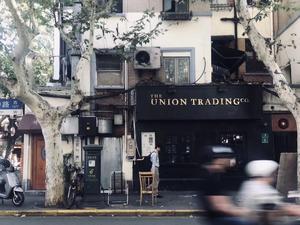 Business is returning slowly at The Union Trading Co. (PHOTO PROVIDED TO CHINA DAILY)
Business is returning slowly at The Union Trading Co. (PHOTO PROVIDED TO CHINA DAILY)
Boon for others
While the pandemic has been disastrous for many food and beverage outlets, delivery services and fresh food producers have thrived, with most people staying home to avoid possible infection.
Last month, the delivery platform JD Daojia saw sales of vegetables rise by 60 percent compared with the same period a year ago. Sales of cooking oil, rice, flour and meat products doubled year-on-year.
According to the platform, fruit, vegetables, eggs and dairy products topped Shanghai residents' shopping lists. Upscale supermarkets with a presence on JD Daojia, such as 7Fresh, G-Super and City Super, also took more than twice the revenue compared with the same period last year.
Meanwhile, Dingdong Fresh, a fresh produce delivery platform, saw its number of orders between late January and mid-February soar by 80 percent year-on-year.
Company CEO Liang Changlin said growth was also due to other factors, such as a 70 percent year-on-year rise in the average purchase price per order.
"The trend has accelerated the development of online grocery purchases, and this is an irreversible trend even though we've flattened the curve (of infections)," Liang said.
"Our data suggest that a majority of users have become accustomed to cooking, so the key task now is to try to retain our users, rather than simply expand business scope."
Many people have been ordering takeouts. Wang Lei, head of Alibaba's local business services unit, said the number of food delivery orders on its platforms in February and March grew tenfold year-on-year.
According to a report released last month by the group-buying website Meituan Dianping, the pandemic has seen an influx of new users joining its platforms, with more than two-thirds of them in their 40s and 50s.
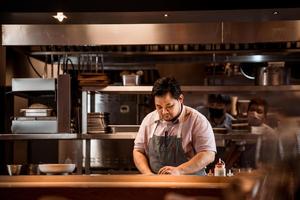 Chef Austin Hu works at the Madison Soul Goodness pop-up event. (GRAEME KENNEDY / FOR CHINA DAILY)
Chef Austin Hu works at the Madison Soul Goodness pop-up event. (GRAEME KENNEDY / FOR CHINA DAILY)
Changes look certain
Business owners said it remains to be seen if reduced spending at restaurants and more cooking at home will now predominate. Changes to business operations, however, are almost certain.
Yao, from The Union Trading Co, said: "The pandemic has shown us how one-dimensional F&B businesses are. This means that finding alternative ways to create revenue will be important.
"Businesses will also need to do more financial planning and staff education. In our case, we will be teaching our team of bartenders about managing finances-both business and personal-as well as things that are beyond their regular scope of work."
Hu, from Heritage by Madison, believes that while the crisis has highlighted the importance of improving efficiency and productivity, it is unlikely that bars and restaurants can radically change the way in which they operate, as such businesses are based on human interaction.
"There is little you can do to change how a restaurant is run. There are certainly ways to streamline the process, as you see many chains or fast food restaurants do, but it's hard to embrace such a direction without losing the soul and personal touch that defines the better restaurants," he said.
Chow, from Bites and Bottle-O, said that if a pandemic emerged again in the future, stronger support from the authorities would be welcomed. He added that while the government had provided tax relief for food businesses such as his, the impact had been minimal.
Subsidies to help businesses retain staff members would go a long way in assisting small and medium-sized restaurants to weather the storm, he said.
Hu said that while social security benefits provided by the government had provided some relief for his employees, more could be done in the future.
"Some of the initiatives I've seen discussed, such as tax breaks, are great for my employees but of little benefit to me because they don't help me pay staff salaries or rent," he said.
"Of course, I totally understand that we're not the priority right now, as many areas of society are far more in need of resources than we are. Medical personnel, the elderly and the infirm, resolving education for kids unable to go to school-these are all pressing issues that need resolving more urgently than ours."
Contact the writers at alywin@chinadaily.com.cn


